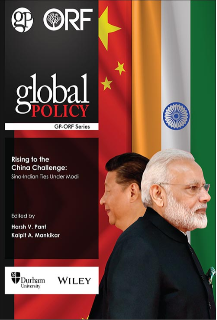Introduction
Pandemics are not merely a health concern, they deeply impact economies and communities as well. The COVID-19 pandemic has exposed the fragility of healthcare systems, the inadequacy of social protections frameworks and the vulnerability of global supply chains. Since the first case of COVID-19 was confirmed in December 2019 in China’s Wuhan—with the Wuhan wet market the suspected source—more than 200 countries[1] and regions have been affected.
The World Health Organization (WHO) declared COVID-19 a pandemic on 11 March 2020, and named the virus that caused it as the ‘Severe Acute Respiratory Syndrome Coronavirus 2’ or SARS-CoV-2. The virus is transmitted by inhaling droplets through close contact with infected persons. Symptoms for COVID-19 can range from mild (like a common cold) to those indicative of acute respiratory illness,[2] and include fever, cough, sore throat, breathlessness and fatigue. The elderly and persons with co-morbidities, such as diabetes, hypertension and non-communicable diseases, have been found to be the most at risk.
The COVID-19 pandemic has cost lives and livelihoods across the globe. According to the World Trade Organization and Organization for Economic Cooperation and Development,[3] COVID-19 is a bigger threat to the global economy than the 2008 financial crisis was. The imposition of lockdowns to curb the spread of the virus has resulted in the slowdown of the global economy, which has directly affected the GDPs of countries, particularly emerging economies. Major industries and businesses were disrupted with the suspension of transportation services (flights, railways, buses, trucks and other forms of public and private transport). Consequently, entire economies came to a grinding halt. No sector has been left untouched by the pandemic. Tourism came to a standstill, and educational institutes and workplaces transitioned to remote and digital spaces. Many countries now face the threat of high inflation rates[4] and a rise in unemployment[5] due to decreased productivity and increased healthcare expenditure to combat COVID-19.
As we arrive at the six-month mark of the pandemic, ‘unlocks’ (gradual reopening of the economy) have been initiated in many countries, even as global infection rates continue to rise. As of 10 September, more than 28 million people have been infected by COVID-19, with the US, India and Brazil accounting for over 50 percent of all cases.
In such difficult and trying circumstances, technology has provided solutions. Technological tools have been at the forefront of the fight against COVID-19, not only providing access to essential and telehealth services, but also helping keep friends and families connected while being socially distanced. The enhanced role of technology has accelerated innovations in healthcare, with countries’ entire medical systems and researchers racing to find a viable vaccine for COVID-19. As WHO has warned of the likelihood of the pandemic worsening, governments across the world face the dilemma of having to choose between limiting the spread of the virus through lockdown measures or kickstarting and reopening stalled economies to prevent further damage to lives and livelihoods.
This series brings together essays from countries worst hit by the pandemic. They showcase how governments, societies and businesses have tried to adapt to the “new normal” using all available tools and strategies, including contact tracing apps and social distancing measures. As we look back at the last six months of the COVID-19
pandemic, these essays will highlight the cross-learnings on the management of the pandemic and the solutions that have been found to mitigate the crisis.
Contents
Author: Dawisson Belém Lopes
Author: Fernando Brancoli
Author: Shahid Jameel
Author: Viktoriia Ivanchenko
Author: Clarissa Rios Rojas
Author: Silvana Lopez
Authors: Miguel Otero-Iglesias and Ignacio Molina
Author: Sridhar Venkatapuram
Author: Saba Shahid
Defying the Odds: Pakistan’s Coronavirus Story
Author: Amina Bajwa
Author: Nicolas Bauquet
Author: Amrita Narlikar
Access the full monograph here.
Endnote
[1] “Countries where Covid-19 has spread”, Worldometer, September 7, 2020.
[2] Tanu Sighal, “A Review of Coronavirus Disease-2019 (COVID-19),” Ind J Pediatr 87 (2020): 281-86.
[3] “The impact of the coronavirus (COVID-19) crisis on development finance,” OECD Policy Responce to COVID-19, June 24, 2020.
[4] Dan Kopf, “Covid-19 is distorting inflation numbers around the world”, Quartz, June 17, 2020.
[5] David Evans and Amina Mendez Acosta, “The Economic impact of OVID-19: After record unemployment, countries around the world begin to reopen industries”, Centre for Global Development, June 5, 2020.
The views expressed above belong to the author(s). ORF research and analyses now available on Telegram! Click here to access our curated content — blogs, longforms and interviews.

 PDF Download
PDF Download



 PREV
PREV


